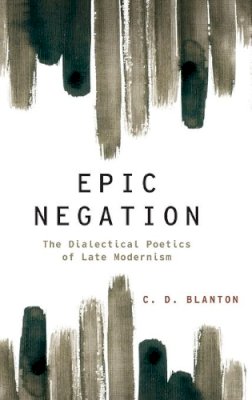
Stock image for illustration purposes only - book cover, edition or condition may vary.
Epic Negation: The Dialectical Poetics of Late Modernism
C.D. Blanton
€ 135.91
FREE Delivery in Ireland
Description for Epic Negation: The Dialectical Poetics of Late Modernism
Hardback. Epic Negation examines the dialectical turn of modernist poetry over the interwar period, arguing that late modernism inverts the method of Ezra Pound's "poem including history" to conceive a negated mode of epic, predicated on the encryption of disarticulated historical content. Series: Modernist Literature and Culture. Num Pages: 384 pages. BIC Classification: 2AB; DSBH; DSC. Category: (G) General (US: Trade). Dimension: 244 x 166 x 35. Weight in Grams: 688.
Epic Negation examines the dialectical turn of modernist poetry over the interwar period, arguing that late modernism inverts the method of Ezra Pound's "poem including history" to conceive a negated mode of epic, predicated on the encryption of disarticulated historical content. Compelled to register the force of a totality it cannot represent, this negated epic reorients the function of poetic language and reference, remaking the poem, and late modernism generally, as a critical instrument of dialectical reason. Part I reads The Waste Land alongside the review it prefaced, The Criterion, arguing that the poem establishes the editorial method with which T. S. Eliot constructs the review's totalizing account of culture. Dividing the epic's critical function from its style, Eliot not only includes history differently, but also formulates an intricately dialectical account of the interwar crisis of bourgeois culture, formed in the image of a Marxian critique it opposes. Part II turns to the second war's onset, tracing the dislocated formal effects of an epic gone underground. In the elegies and pastorals of W. H. Auden and Louis MacNeice, lyric forms divulge the determining force of unmentionable but universal events, dividing experience against consciousness. With H.D.'s war trilogy, produced in a terse exchange with Freud's Moses, even the poetic image lapses, associating epic with the silent historical force of the unconscious as such.
Product Details
Publisher
Oxford University Press Inc
Format
Hardback
Publication date
2015
Series
Modernist Literature and Culture
Condition
New
Weight
688g
Number of Pages
384
Place of Publication
New York, United States
ISBN
9780199844715
SKU
V9780199844715
Shipping Time
Usually ships in 15 to 20 working days
Ref
99-6
About C.D. Blanton
Blanton is Assistant Professor of English at the University of California at Berkeley. He is coeditor of A Concise Companion to Postwar British and Irish Poetry (Blackwell, 2009).
Reviews for Epic Negation: The Dialectical Poetics of Late Modernism
ambitious, scholarly ... Highly recommended.
B. Wallenstein, CHOICE
Epic Negation represents a powerful, theoretically sophisticated, and cohesive account of twenty-five crucial years of twentieth-century British literary history, while offering a framework for a number of subtle new readings of key works from the end of World War I to the end of World War II. Along the way, C. D. Blanton engages in an impressive sweep of more localized literary historical investigations and theoretical reflections.
Tyrus Miller, author of Modernism and the Frankfurt School
Intricately studying allusion and intergeneric relations in late modernism, C. D. Blanton's capacious and deeply thoughtful Epic Negation traces how extrinsic voices, historical forces, and forms snake their way into even seemingly closed poems. With its fusion of sinuous close readings and lively theoretical analysis, Blanton's book makes a serious contribution to twentieth-century poetry studies.
Jahan Ramazani, author of Poetry and Its Others: News, Prayer, Song, and the Dialogue of Genres
C. D. Blanton revives the intractable subject of modern epic poetry by reminding us that thinkers and poets as divergent as Pound and Lukacs were once engaged in a common dialectical project. In doing so, he puts back into circulation questions that sustained the feverish modernist debate about totality (and totalitarianism)-questions that may now help us understand poetry's possible relation to new forms of globalism.
Daniel Tiffany, author of My Silver Planet: A Secret History of Poetry and Kitsch
B. Wallenstein, CHOICE
Epic Negation represents a powerful, theoretically sophisticated, and cohesive account of twenty-five crucial years of twentieth-century British literary history, while offering a framework for a number of subtle new readings of key works from the end of World War I to the end of World War II. Along the way, C. D. Blanton engages in an impressive sweep of more localized literary historical investigations and theoretical reflections.
Tyrus Miller, author of Modernism and the Frankfurt School
Intricately studying allusion and intergeneric relations in late modernism, C. D. Blanton's capacious and deeply thoughtful Epic Negation traces how extrinsic voices, historical forces, and forms snake their way into even seemingly closed poems. With its fusion of sinuous close readings and lively theoretical analysis, Blanton's book makes a serious contribution to twentieth-century poetry studies.
Jahan Ramazani, author of Poetry and Its Others: News, Prayer, Song, and the Dialogue of Genres
C. D. Blanton revives the intractable subject of modern epic poetry by reminding us that thinkers and poets as divergent as Pound and Lukacs were once engaged in a common dialectical project. In doing so, he puts back into circulation questions that sustained the feverish modernist debate about totality (and totalitarianism)-questions that may now help us understand poetry's possible relation to new forms of globalism.
Daniel Tiffany, author of My Silver Planet: A Secret History of Poetry and Kitsch
